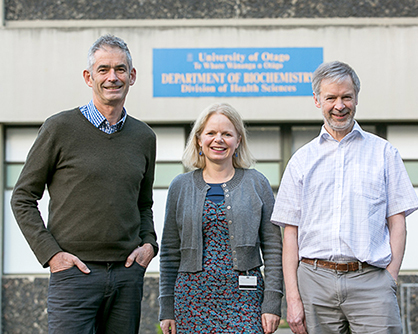 Biochemistry staff have been awarded three Health Research Council grants totaling over seven million dollars in the most recent funding round.
Biochemistry staff have been awarded three Health Research Council grants totaling over seven million dollars in the most recent funding round.
Professor Parry Guilford receives $4,971,155 over five years for "Reducing the burden of gastric cancer in New Zealand"
Gastric (stomach) cancer is the 2nd greatest cause of cancer death worldwide. In New Zealand, it is remarkable for its incidence in Maori and Pacific people being three-fold greater than in non-Maori. It is clear that a significant proportion of the gastric cancer burden in New Zealand could be avoided by an improved understanding of environmental and genetic risk factors, better diagnostic methods, more accurately targeted treatments and improvements in health delivery mechanisms. These gains will have particularly benefit for our highest risk populations, thereby reducing health inequalities. In this research, our goal is to reduce the burden of gastric cancer in vulnerable New Zealand populations through a series of linked, multidisciplinary projects.
Professor Catherine Day, receives $1,185,038 over three years for "Integration of inflammatory signalling by TNF receptor associated factors"
Initiation and resolution of inflammation is essential for cellular homeostasis, and aberrations are associated with a range of diseases. Regulation of inflammation relies on signals transmitted from receptors on the surface of cells to the nucleus. Often, several cell surface receptors act in combination to elicit a particular inflammatory response. TNF receptor associated factors (TRAFs) are a key family of proteins that recognise many different activated receptors, and translate their signals into an appropriate response. Improper TRAF signalling is implicated in cancer, chronic inflammatory disorders and immune deficiency. The proposed project will investigate precisely how TRAF proteins function in combination with each other to reliably integrate inflammatory signals. This work will provide fundamental knowledge about the mechanisms of inflammatory signalling, identify possible molecular targets for cancer and chronic inflammation, and explain how existing therapies that target immune receptors control downstream signalling pathways might be used for maximum benefit.
Professor Iain Lamont receives $1,151,504 over three years for "Unmasking genes for antibiotic resistance in a superbug"
The rapid rise of superbugs, bacteria that are resistant to all available antibiotics, is an increasing threat to health with the potential to overwhelm the healthcare system. However, our understanding of how bacteria resist antibiotics is far from complete. During infection the superbug Pseudomonas aeruginosa undergoes multiple mutations and evolves very high antibiotic resistance but only a subset of the mutations causing resistance have been identified. In this research we will obtain the first full overview of mutational events that result in high-level resistance. We will do so by developing highly resistant mutants of P. aeruginosa under controlled laboratory conditions, comparing the underlying mutations with those that occur during infection, and determining the effects of key mutations in a mouse model of infection. The results will provide a major step forward in understanding how bacteria resist antibiotics and may lead to improved treatment regimens for P. aeruginosa and other superbugs.
